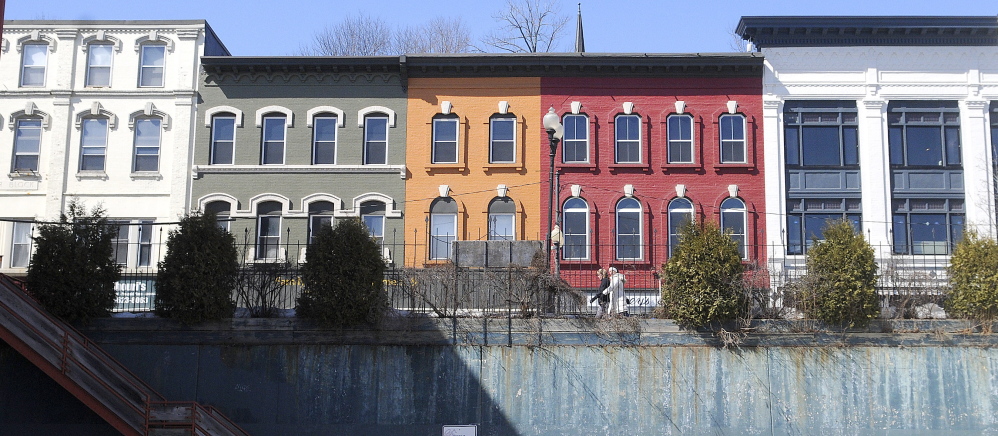AUGUSTA — Capital city officials will kick off a downtown financial incentive plan Jan. 1 aimed at sparking the continued revitalization of the downtown waterfront.
The Tipping Point Small Business Development Program, in partnership with Kennebec Savings Bank, is part of the city’s Augusta Downtown Tipping Point Initiative, a three-pronged proposal meant to spur downtown redevelopment. The program provides incentives to downtown property owners to start businesses, renovate and repair existing buildings and convert vacant and under-used space into housing.
“We’ve had some great successes in the downtown district in the past year, but people know there are still numerous vacancies,” said Keith Luke, Augusta’s deputy director of development services. “We’re trying everything we can to get those spaces filled.”
As part of the program, Kennebec Savings Bank has created a $250,000 small business loan pool, and the city has agreed to cover the interest costs for a five-year loan term. Andrew Silsby, the bank’s president and CEO, said he’s excited about the possibilities.
“We’ve been focusing on all of the downtowns and main streets in our service areas, and each are unique in terms of what their needs are,” he said. “I really feel like Water Street is at a tipping point, and I’m really excited.”
Luke spoke candidly about some of the challenges facing downtown revitalization, and he said he’s had some prospective or current business owners tell him that they aren’t interested in coming to Water Street. He said it left him flatfooted and unsure.
He said Water Street needs a mix of businesses downtown so Augusta can differentiate itself from downtowns in Gardiner or Hallowell, and he thinks there are a couple of things the downtown is missing.
“We really need a destination draw like a Mexicali Blues or a music store, something that is fun and funky and that’ll get people in their cars to drive to Water Street in Augusta because it’s the only place to find this type of unique product,” he said.
On the other hand, a store like Renys would certainly be welcome on Water Street, but there already is a location 12 minutes away in Gardiner, so Luke isn’t sure the company wants two stores in such proximity to each other.
“If a company like that wanted to come to Water Street, we’d welcome them,” Luke said, “but it would be nice to differentiate downtown Augusta so it doesn’t look like everyone else’s downtown.”
Many developers are currently working on projects to create new, middle to high-end rental units, which Silsby said is essential to bringing life back to the waterfront. He said creating a quaint atmosphere rather than a business-only district is important.
“That’s really the key,” he said. “You need restaurants and some nightlife, because that’s where I think the success will come.”
Silsby pointed at Hallowell’s downtown as something Augusta could look at as a model. Hallowell’s Water Street historic district has a mix of apartments, restaurants and bars and several retail shops that make a destination for people from across Maine.
“When I go to Hallowell, I don’t just go to one business,” Luke said. “I’m going to several different places to see who’s out and about.”
But Luke said he wants a mix of businesses downtown so that people who might otherwise go to Hallowell would instead come to Water Street in Augusta to hear music and try local beer or different foods.
“It’s hard when we compartmentalize our downtowns in standalone ways,” Luke said. “It’s important we don’t get caught up in that.”
Some Augusta officials expressed concern in October about the higher-end residential units pushing low-income renters out of the downtown, but supporters of the program said there are already low-income housing options downtown, but not enough available housing for the high-demand middle and high-income rental market.
“I think we’ve made some great strides downtown, and the program we’ve put together can play an important part,” Luke said. “I think 2017 will be a strong year for Augusta.”
Part of the new program also provides building owners grants of up to $2,000 per unit to create new apartments on the upper floors of downtown buildings, and there is a $25,000 minimum expenditure. The city has allocated funds for 17 residential conversion grants, which will be awarded on a first-come, first-served basis.
Luke said the city will market their new program at several upcoming business attraction events and will be sending program details to about 60 landlords in early January.
“We’ve got this material to put in their hands, but more importantly, we need to engage them in conversation about what their needs are and what we can do to help them,” he said. “It’s another tool in the toolbox.”
Luke said Kennebec Savings Bank has been a “tremendous” part of the program in part because of the dedication and availability of Silsby. They have a large presence in central Maine and on Water Street, and they get personally involved in the projects they finance, Luke said, which is a valuable connection for the city.
“And Andrew takes my calls, usually on the first or second ring,” Luke joked. “Which is a real advantage not just for me, but for all businesspeople in central Maine.”
For Silsby, having grown up in Augusta, partnering with the city was an easy decision.
“I’m particularly fond of the Augusta downtown, and the bank was on Water Street from 1870 until 1959,” Silsby said. “We consider ourselves part of the downtown.”
Luke said he’s thinking of this as a pilot program that will run for at least one year or until the loan pool is drained. To help developers, the city is waiving required building permit fees for the construction, repair or improvements to all multi-family residential properties citywide through Jan. 1, 2018.
Jason Pafundi — 621-5663
Twitter: @jasonpafundiKJ
Send questions/comments to the editors.




Comments are no longer available on this story